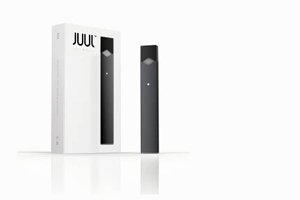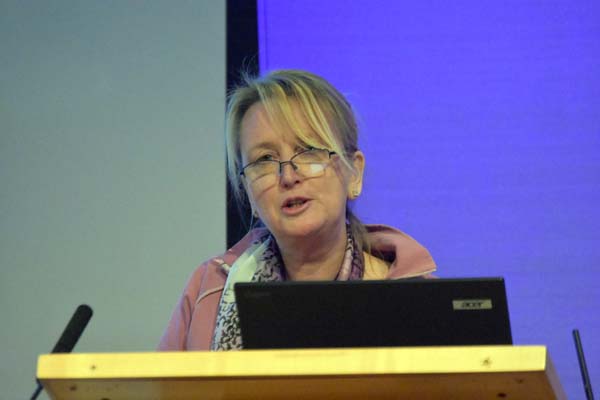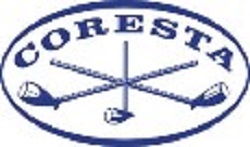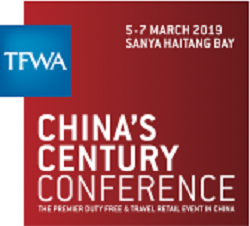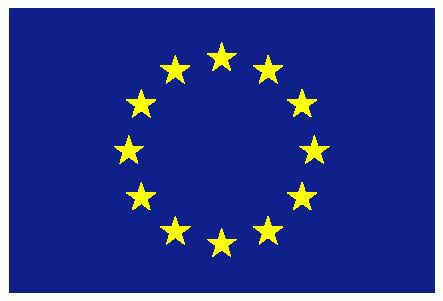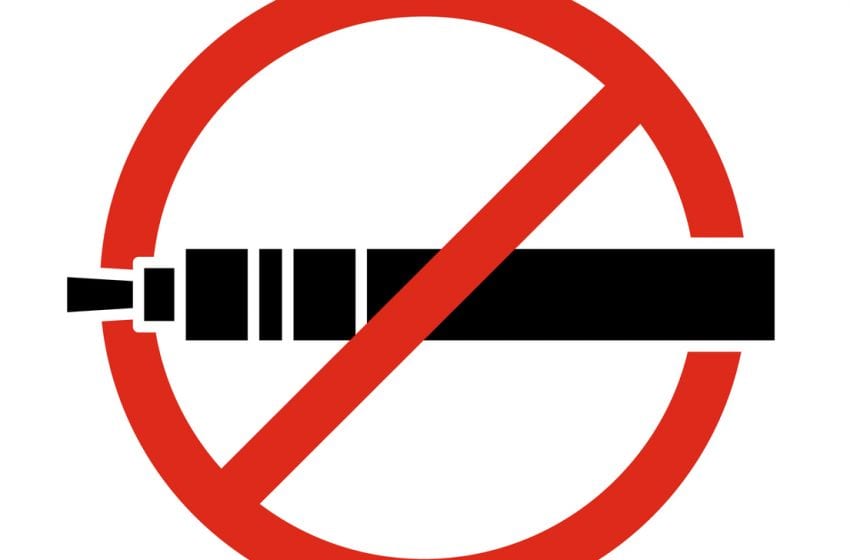US sales of the electronic cigarette Juul rose from 2.2 million in 2016 to 16.2 million in 2017, according to a HealthDay story quoting the results of a study by the Centers for Disease Control and Prevention (CDCP).
The CDCP study took in e-cigarette purchases from regular retail stores, but did not include sales through the internet or from vape shops; so the sales figures comprise an underestimate.
Juul had captured the biggest share of the US e-cigarette market as of December 2017, accounting for nearly one in three of the e-cigarettes sold nationwide.
Juul is said to have among the highest nicotine content of any e-cigarette sold in the US, a concern for the CDCP, which, according to the HealthDay story, says that nicotine is ‘highly addictive’ and can harm brain development in teens and young adults.
The Food and Drug Administration on September 12 demanded that, within 60 days, five electronic-cigarette manufacturers, including Juul Labs, accounting for 97 percent of the market for these products, come up with robust ways of addressing what the agency described as an ‘epidemic’ of teenage vaping or face market restrictions on their products.
‘There are no redeeming benefits of e-cigarettes for young people,’ Corinne Graffunder, director of the CDCP’s Office on Smoking and Health, said in an agency news release. ‘The use of certain USB-shaped e-cigarettes is especially dangerous among youth because these products contain extremely high levels of nicotine, which can harm the developing adolescent brain.’
The CDC findings were published on October 2 in the Journal of the American Medical Association.
HealthDay reported that Juul had issued a statement on the same day defending its product.
‘Juul Labs is focused on its mission to improve the lives of the world’s one billion adult smokers,’ the company said in its statement. ‘When adult smokers find a satisfying alternative to cigarettes, they tell other adult smokers. Juul Labs has helped more than one million Americans switch from cigarettes.’
Category: Technology

Juul sales rocket-powered

Understanding sought
The US Food and Drug Administration said yesterday it had seized from Juul Labs more than a thousand pages of documents related to the company’s sales and marketing practices, according to a story by Ankur Banerjee and Tamara Mathias for Reuters.
The seizures were said to have come during a surprise inspection.
The inspection, completed on Friday, followed a request in April for documents that the FDA believed would help it better understand the high levels of Juul’s appeal and use among young people.
The FDA said it had conducted also inspections of several of Juul’s contract manufacturing units earlier this year.
Meanwhile, Juul Labs CEO Kevin Burns was quoted as saying in a statement that the company had handed over to the FDA since April more than 50,000 pages of documents that supported its public statements, before adding that the meeting with the regulator had been constructive and transparent.
“We want to be part of the solution in preventing underage use, and we believe it will take industry and regulators working together to restrict youth access,” said Burns.
COP8 – a 'great opportunity'
An international meeting of tobacco control representatives this week presents a great opportunity for UK delegates to promote the UK’s dramatic success with electronic cigarettes, according to the New Nicotine Alliance (NNA).
The eighth meeting of the Conference of the Parties (COP8) to the World Health Organization’s Framework Convention on Tobacco Control (FCTC) is taking place in Geneva, Switzerland, on October 1-6.
In a press note issued on Friday, the NNA said the FCTC’s COP8 summit in Geneva presented a great opportunity for UK delegates to promote the UK’s dramatic success with e-cigarettes. The NNA said it was calling on UK delegates to communicate to global public health representatives the clear and unequivocal message that e-cigarettes and other alternative nicotine products were far safer than combustible tobacco and should be treated as such.
“E-cigarettes are a proven safer alternative to smoking and the UK boasts over 1.7 million former smokers who have converted from combustible tobacco to exclusively vaping instead,” NNA chair, Sarah Jakes, was quoted as saying.
“In the UK, the government has wisely recognised the significant benefits that tobacco harm reduction strategies can achieve and, as a result of positive messaging towards vaping with campaigns such as Stoptober, has seen smoking prevalence dramatically plummet in recent years.
“COP8 is a perfect opportunity for the UK to showcase this success and share our positive experience with the world.
“How can it be right that developed nations are enjoying great results in reducing the use of combustible tobacco by making safer alternatives available to smokers but sit by as less affluent nations are being railroaded into banning them by the WHO?”
The NNA pointed out that the UK government’s Tobacco Control Plan had committed to back innovative products in its drive to encourage smokers to quit. The government’s recommendations were evidence-based and designed to maximise the benefits of safer nicotine delivery.
Meanwhile, it added, the WHO recognised tobacco harm reduction as a guiding principle of its FCTC, so it was quite wrong that it currently invited nations to prohibit the use of these products.
“The WHO likes to talk about the right to health, but why is a smoker in India or Africa less entitled to access products which could help them quit smoking than a smoker in the UK or Canada?”, asked Jakes. “Furthermore, we have heard worrying reports that the EU is planning to petition the FCTC to call for a global ban on e-cigarette advertising. It would be scandalous if the UK delegation is complicit in such an unwise move and goes against the government’s commitment to improve availability of innovative products. What is the point of talking positively of safer alternatives while simultaneously stopping smokers from seeing any publicity about them?
“In Geneva, the UK’s representatives have a golden opportunity to promote the UK’s success with safer nicotine products.
“We provide the FCTC with generous funding to reduce smoking rates in underdeveloped nations. We would therefore urge the government to use the influence our financial contribution brings and do the right thing. That is to reject prohibition of harm reduction which less affluent nations feel obliged to implement due to WHO misinformation, urge the FCTC to adhere to its own articles on the subject, and resist restrictions on promotion of less harmful alternatives to smoking”
Registration deadline nears
On-line registration for the 2018 CORESTA (Co-operation Centre for Scientific Research Relative to Tobacco) Congress in China is due to close at midnight local time on October 7, according to a note issued by the organization’s Secretariat.
Registration is available through www.corestakunming2018.com, and assistance is available from Lancia (lancia@coresta2018.org) or Demi (demi@coresta2018.org).
The Congress is due to be hosted by the China National Tobacco Corporation at the Intercontinental Hotel in Kunming, the capital of Yunnan Province, on October 22-26.
The theme of the 2018 Congress is Science and Innovation: addressing the needs.
According to a previous CORESTA press note; in line with this theme, CORESTA’s Scientific Commission wants the event to be an opportunity for delegates to share their experience with the broad scientific community, within and beyond the tobacco perspective.
‘Workshops will be arranged to foster open dialogue on crop protection, biotechnologies, product risk assessment and biomarkers,’ the note said.
‘This approach will provide valuable information to all stakeholders in the increasingly challenging regulatory environment.
‘Latest updates and scientific achievements and findings will be presented to the benefit of both experienced and new scientists.’
TFWA launches app
The TFWA (Tax-free World Association) has launched a dedicated app to enhance the delegate experience at its events and promote participation in the wider TFWA community.
‘With growing demand for digital solutions in the duty-free and travel-retail space, the TFWA app will provide greater functionality for anyone attending Association events or looking to keep up to date with the latest industry news,’ the TFWA said in a press note.
‘Delegates at this year’s TFWA World Exhibition & Conference in Cannes (September 30 – October 5) will be among the first to try the app for themselves. Users will gain access to a number of exclusive on-site services, such as a new geolocation feature to help them navigate their way around the venue. Other functions include the option to contact and meet business partners directly via the app, and the ability to comment and put questions to speakers at TFWA Conferences. Full details on exhibiting companies are also available through the app.
‘The app will also deliver engaging, topical content on Association news and activities throughout the year, while providing a portable link to the Association to encourage interaction and foster a sense of community among duty-free and travel-retail professionals.’
TFWA President Erik Juul-Mortensen said that, much like the rest of the duty-free and travel-retail industry, the Association was investing heavily in digital technology to help it better engage with delegates and provide them with new ways to learn from their colleagues and share their views on important business issues.
The TFWA app is available to download at the App Store and Google Play.
Vaping evidence highlighted
An Irish member of the EU Parliament has asked the Commission whether it will be taking account of the contents of a UK parliamentary report and a letter signed by four academics – both of which come out in favor of vaping – when the Commission produces its implementation report on the Tobacco Products Directive.
In a preamble to his questions, Luke Ming Flanagan thanked the Commission for its answer to his previous question on vaping and the Tobacco Products Directive (E-002293/2018).
Flanagan then asked, with reference to the Commission’s statement that it continuously monitored developments, whether it was aware of the recent all-party UK House of Commons Science and Technology Committee report that was published on August 17 and that came out strongly in favor of vaping.
He asked also; was the Commission aware of the submission to the World Health Organization of a letter signed by four top academics, again outlining, in great detail, the case in favor of vaping.
And he asked whether the Commission could confirm that it would now take those reports into consideration in the implementation report it was required to submit in 2021, in line with Article 28(1) of the directive.
The Commission is due to reply in writing.Alarmism overused
‘FDA [the US Food and Drug Administration] seems to just be going around in circles,’ according to Lindsey Stroud, state government relations manager at The Heartland Institute.
Stroud was commenting on a recent FDA demand that five electronic-cigarette manufacturers address within 60 days what the agency describes as an “epidemic” of teenage vaping or face possible market restrictions on their products: blu, Juul, Logic, MarkTen, and Vuse.
‘Despite the alarmism, youth vaping dropped in 2016 and remained flat in 2017,’ said Stroud.
‘And youth cigarette smoking – it’s at an all-time low.
‘As tobacco companies have been doing for decades, electronic cigarette manufacturers are investing millions into anti-youth initiatives, and some states like Massachusetts have publicly refused to take their money.
‘Retailers in vape shops practice strict and responsible policies to ensure underage consumers are not purchasing vaping products.’
At the same time, Stroud said, the FDA had yet to approve a premarket tobacco product application. ‘Delaying such products limits companies’ ability to modify their current products to be even more child-resistant, including locks on these products,’ she said.
‘Although “protecting the children” is a laudable goal, this rhetoric is overused and threatens the millions of smokers who have quit smoking combustible cigarettes by using these products.’
It's time for action
The US Food and Drug Administration has failed to approve a single reduced-harm nicotine product in the past year, despite having unveiled a new ‘roadmap’ in July 2017 that emphasized the role such products can play in reducing tobacco-related illness, according to a piece by Michelle Minton at cei.org.
‘That lapse does a huge disservice to millions of smokers who could benefit from switching from cigarettes to a far less harmful product,’ Minton said.
‘A year ago, the FDA claimed it would balance regulation against encouraging the development of harm-reducing products. But with each passing week it’s become clear that the biggest roadblock on the path to tobacco harm reduction is the agency’s own cumbersome product approval process.’
Minton pointed out that it would be easy for the FDA to encourage the development of less harmful nicotine products for smokers. The market already provided alternatives in the form of e-cigarettes, smokeless tobacco, and heat-not-burn devices, she said. All that was needed to make these products available and viable as smoking cessation tools was for the FDA to establish a regulatory structure that made it easier and cheaper for manufacturers to earn FDA approval to sell the products and advertise them as being of lower risk than combustible cigarettes.
But the FDA seemed to have done nothing to reform its pre-market tobacco approval gauntlet. During the past two years, the agency had received 367 premarket tobacco applications, which are required for the products to be sold legally in the US. None had been approved. The agency had received also 35 Modified Risk Tobacco Product applications (MRTP), which would allow tobacco products to be advertised as lower risk. The agency had not approved any such application, ever.
Minton pointed out that snus had helped Sweden get its smoking rate down to five percent, lower by far than any other EU nation and the US; and, as a result, Sweden had one of the lowest incidences of lung cancer and oral cancers in the EU.
While snus could be sold in the US, it could not be advertised as being of lower risk than cigarettes, even though it was. Consequently, US consumers saw little reason to switch from smoking to smokeless tobacco.
So far, the FDA had considered MRTPs from several snus companies, including Swedish Match, which submitted an application in 2014 and was denied two and half years later. Currently, R.J. Reynolds, which submitted an MRTP in March 2017, was still waiting on a decision from the FDA.
[In December 2016, the FDA announced a partial ruling offering Swedish Match two years to submit an amended application, and TR understands that the company is finalizing its amendment and plans to submit it soon.]
CORESTA reporting
The CORESTA (Co-operation Centre for Scientific Research Relative to Tobacco) Secretariat has given details of the documents that it has published and the projects that it has launched since May.
The following documents have been published and can be downloaded from the Documents section of the CORESTA website at www.coresta.org.- Method No. 64 “Routine Analytical Cigar-Smoking Machine – Specifications, Definitions and Standard Conditions” updated
(2018-05-15) (CSM-121-1-CRM-64)
- Report “2017 Collaborative Study on Carbonyl Containing Compounds in Electronic Cigarette Liquids”
(2018-05-17) (EVAP-127-1-CTR)
- Method No. 46 “Atmosphere for Conditioning and Testing Cigars of all Sizes and Shapes” updated
(2018-06-11) (CSM-121-3-CRM-46)
- Report “5th Round Robin Test for Multi-Capillary Ventilation Calibration Standards (2016/2017)”
(2018-06-19) (PTM-124-CTR)
- Guide No. 1 “Agrochemical Guidance Residue Levels (GRLs)” updated
(2018-06-28) (ACAC-195-CTG-01)
- Report “Sub-Group Collaborative Study on Blue Mould – Final Report”
(2018-07-03) (BM-025-CTR)
- Report “Joint Experiment Technical Study (JETS) Report 17/1 Maleic Hydrazide in Tobacco”
(2018-07-27) (AA-130-CTR)
- Report “Tobacco Virus Collaborative Study (1996-2011)”
(2018-08-07) (VIR-030-CTR)
- Report “2018 Moisture (Oven Volatiles), Water by Karl Fischer and Gas Chromatography Interlaboratory Study”
(2018-08-20) (TTPA-171-1-CTR)
- Report “2018 Proficiency Study for Water Activity of Tobacco and Tobacco Products”
(2018-08-20) (TTPA-172-1-CTR)
- Method No. 57 “Determination of Water in Tobacco and Tobacco Products by Gas Chromatographic Analysis” updated
(2018-08-21) (TTPA-188-2-CRM-57)
- Method No. 56 “Determination of Water in Tobacco and Tobacco Products by Karl Fischer Method” updated
(2018-08-30) (TTPA-188-1-CRM-56)
Meanwhile, a list of active projects is available on the CORESTA website under the
Study Groups/Active Projects section:- Project 186: BMK SG – Meta-analysis of Cigarette Smoke Exposure Biomarkers
- Project 187: RAC SG – CM8 & CM9 Collaborative Studies – 2018
- Project 188: TTPA SG – Systematic Review of CRMs 56 and 57 (completed)
- Project 189: AA SG – 14th FAPAS CPA Analysis Proficiency Test – 2018
- Project 190: Consumer Reported Outcome Measures (CROM) Consortium (approval pending)
- Project 191: PTM SG – 7th Round Robin Test on Filter Ventilation Calibration Standards
- Project 192: PTM SG – Systematic Review of CORESTA Guide No. 4
- Project 193: TTPA SG – Collaborative Study for the Determination of Nicotine in Tobacco and Tobacco Products
- Project 194: SMA SG – Systematic Review of CRM 78
- Project 195: ACAC SG – CORESTA Guide No. 1: Addition of CPA Fluopyram to GRL list (completed)

E-cig stance challenged
The recent advisory issued by India’s Union Ministry of Health and Family Welfare to the State government seeking a ban on the sale of electronic nicotine delivery systems (ENDS) is based on poor advice and a lack of scientific evidence, according to a story by Bindu Shajan Perappadan at thehindu.com quoting a group representing electronic cigarette users across the country.
The Association of Vapers India (AVI) has hit back at the Center and questioned the motive behind the advisory.
‘ENDS products are being examined across the world for their benefit in harm reduction and as a pathway to smoking cessation,’ the AVI said in a press note. ‘The advisory must be withdrawn immediately…’
Evidence that had been produced during the past two years had shown that a smoker who switched to vaping cut her health risk by more than 95 percent, the AVI said.
And it questioned why the government had not banned tobacco cigarettes if it was so concerned about nicotine.
At the same time, the AVI rubbished the government’s contention that vaping would increase smoking rates among teenagers, citing evidence to the contrary based on a survey of 60,000 teenagers by UK-based Public Health England.
“This claim is bogus as smoking rates among the youth are declining in all countries that have allowed vaping,” said AVI director Samrat Chowdhery. “In fact, overall smoking rates have declined at a historical rate after vaping was introduced. This clearly points to the tremendous harm reduction potential of vaping.”
Meanwhile, Deepak Mukarji of The Alternatives, which advocates harm reduction in respect of people and the planet, said the Alternatives was disappointed with the Central government’s directive on e-cigarettes. This retrograde step denied harm reduction and potentially lifesaving alternatives to smokers by ignoring science and its emerging technologies.
Evidence that the government claimed to have, the AVI said, was either outdated or intentionally misinterpreted; and it was out of line with the view widely accepted by all major scientific institutions that the use of e-cigarettes was substantially less harmful than was smoking combustible cigarettes.
The association blamed the government also for presenting a wrong picture by selectively citing World Health Organization data that 30 countries had banned e-cigarettes, while holding back information that 65 nations had allowed and regulated such products.

